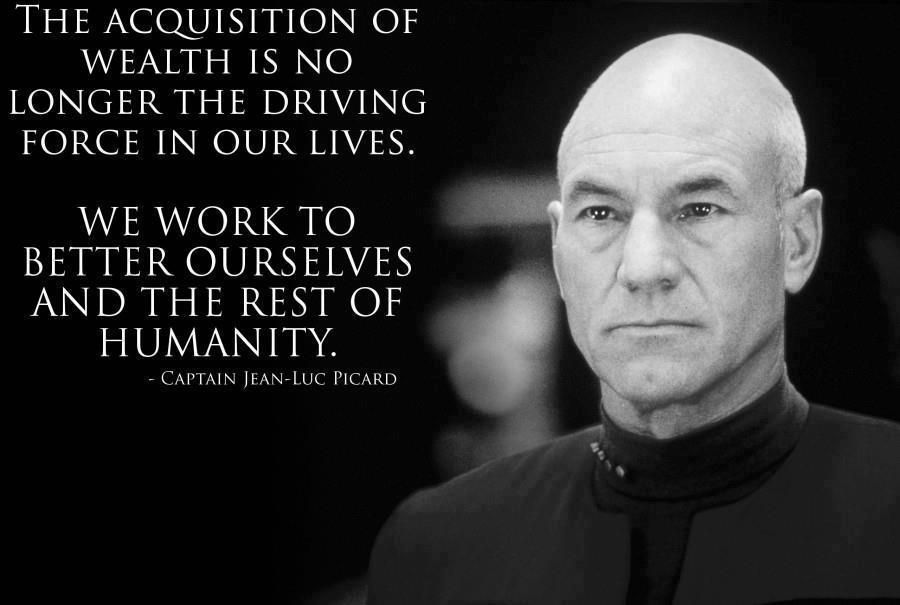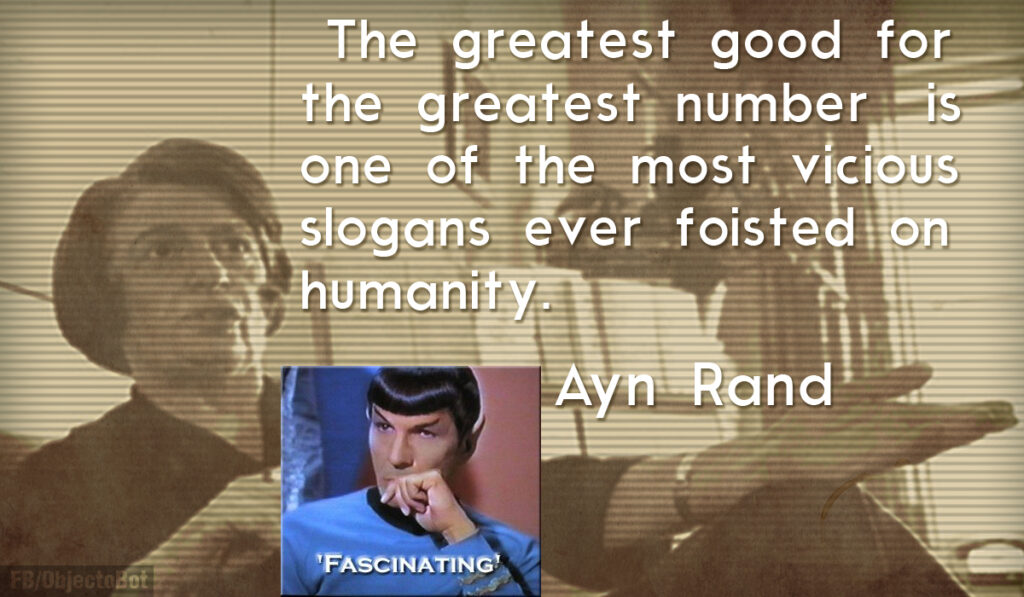Movies and TV shows if not explicitly then implicitly usually expound some sort of philosophies. These philosophies if not consciously then subconsciously are picked up by our culture. Star Trek is a franchise that particularly heavy on philosophy. Famously the Star Trek creator Gene Roddenberry was a socialist.
Before we explore some of the more devious philosophical concepts promoted by Star Trek, I would like to first give credit where credit is due. The overall sense of life of Star Trek is extremely positive. Conflicts in Star Trek see the protagonists struggle to achieve ideals such as freedom, free speech, well maybe not for Wesley, and even some degree of rights.
Money and Trade:

“Money doesn’t exist in the 24th century. The acquisition of wealth is no longer the driving force in our lives. We work to better ourselves and the rest of humanity.” – Picard
Let us unpack this sentence first, “The acquisition of wealth is no longer the driving force in our lives. We work to better ourselves and the rest of humanity.”
Wealth is not acquired, it is created. Wealth doesn’t grow on trees, you can’t just go somewhere and pick up some wealth, it first has to be produced. However, I do not think he is referring to how wealth comes to be, he is simply referencing that humans like to accumulate material wealth. He also cannot be talking about growth, since he does say that they work to better themselves and the rest of humanity, and since in Star Trek there is a constant bettering of technology and so forth, we can safely assume that growth is still a driving force in the 24th century. Thus, he is talking about the accumulation of wealth, or in other words savings. This goes very well with the first part of the sentence that money doesn’t exist in the 24th century. Since savings or wealth accumulation is primarily done with money, it makes sense that in absence of money, accumulation of wealth would also be absent.
This of course is much easier said than done. In our society which still has a certain thing called scarcity, saving is how we are able to build enough capital to grow and better ourselves in any way at all.
In the 24th century where scarcity has essentially been eliminated via technology such as anti-matter reactors that give unlimited free energy, and replicators that can use that energy to literally instantly make any type of material that you need, saving is not necessary. Are you hungry and need some food, just say replicator make me a sandwich. You need shelter, hey replicator makes a house, with furniture, etc. So when Picard says that they are no longer driven by the acquisition of wealth maybe it is because they have already achieved what is essentially an unlimited amount of wealth. In their society, unlike ours, you can literally just pick up some wealth from a replicator any time that you want, so you wouldn’t be concerned with saving it. It is interesting to note that in a capitalist society the primary motive is also not wealth accumulation. A creative man is motivated by the desire to achieve. Steve Jobs didn’t create the iPhone because he primarily wanted a billion dollars. His primary motivation in creating Apple computers, or the iPhone, was to achieve a device that he thought would be superior to anything else available. Accumulation of wealth was a by-product, a secondary consequence of him in fact achieving his goal. Just because you are buildings something, it doesn’t mean you will be successful, in fact, most entrepreneurs fail.
Besides saving, money is also used as a tool for trade. I think in the advanced society of 24th century Star Trek, even with other technology such as AI, androids, and holodecks filing in for literally any service or task a human may want, you would still need some sort of medium of exchange. Maybe Picard meant that there was no official government currency anymore, that the tools of exchange were free for the people to develop as any other technology? Maybe, yet the complete absence of money is highly suspect. Perhaps you sought the advice of a real human doctor rather than a hologram or android. If that doctor was busy with research, why should he spend time on these questions? Maybe because you are a storyteller, and would give him a sneak preview of your upcoming book. It seems to me, that even with the total elimination of material scarcity, some sort of social credit system, or money, would still be required for efficient trade.
Vulcan Utilitarianism:

“Logic clearly dictates that the needs of the many outweigh the needs of the few.” – Spock
This logic is clearly suspect. Does the need for wheat of the many, outweigh the need of the few for freedom? If yes, then slavery or forced labor is clearly a moral imperative. By this logic, any minority can be sacrificed to any majority.
I would imagine that the Vulcans, a race of beings committed to objectivity and logic, would seek to establish a logically consistent moral system base on facts from reality.
The Vulcans would first ask, what is the purpose of morality? They would observe that the purpose of morality is to be a code of values that guides Vulcan’s actions. They would further observe the value is only possible to living things. It is only living things that face the alternative of nonexistence if they do not acquire value. Inanimate matter does not need value, its existence is unconditional. If a butterfly is crushed and dies, its material elements remain, but its life goes out of existence. Thus they would logically conclude that since life is a precondition to value, it must be the standard by which values are judged. What promotes life is good, what destroys it is bad. They would further observe that different organisms by nature have different lives, and so the standard of value must be more specifically custom to that organism’s life. Or in other words, an organism’s own life is that standard of its value and the guide for its behavior. Now that would be logical.
The prime directive: Also known as “Starfleet General Order 1”, “General Order 1”, and the “non-interference directive”) is a guiding principle of Starfleet, prohibiting its members from interfering with the internal and natural development of alien civilizations. The Prime Directive applies particularly to civilizations which are below a certain threshold of technological, scientific and cultural development; preventing starship crews from using their superior technology to impose their own values or ideals on them.

The threshold for help however clearly becomes the development of warp drive space travel. Such a rule makes no sense, as it allows for starfleet to interact and help violent savage societies who have warp drive, while allowing for peaceful moral sociteis to die. Thankfully in Star Trek, the main heroes consistently ignore that prime directive.




